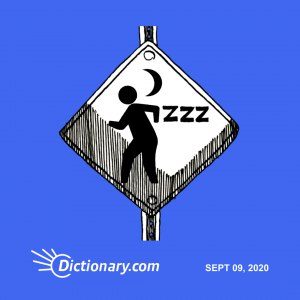Word of the Day
vale
noun
the world, or mortal or earthly life: this vale of tears.
More about vale
Vale may be familiar to some readers from the woeful expression vale of tears, which casts the world as a place of sorrow and difficulty. Vale, “a valley, a low-lying piece of land usually having a brook,” comes from Middle English val, valle, vaile (and more variants), from Old French val, vau, vauls (and more variants), from Latin vallēs (inflectional stem valli-) “valley.” Vale in its literal sense as a geographical feature dates from the second half of the 14th century; the extended, figurative sense, “the world, mortal life, earthly existence,” dates from the first half of the 15th century.
how is vale used?
all he really wanted to do in company was to make jokes, to turn the world upside down and laugh at it, to enrich and enliven this vale of tears with a little fantasy.
As Keats witnessed more and more suffering—his brother Tom’s death; the infectious illnesses sweeping London—he connected his aesthetic vision to lived experience, and wrote in a letter that life is “a vale of soul-making”: “Do you not see how necessary a world of pains and troubles is to school an intelligence and make it a soul?”
vale


somnambulism
noun
sleepwalking.
More about somnambulism
Somnambulism, “sleepwalking,” comes via French somnambulisme from New Latin somnambulismus, a pretty transparent compound of the noun somnus “sleep” and the verb ambulāre “to walk, take a walk, stroll,” source of English amble. Somnus is the Latin result of the very common Proto-Indo-European root swep-, swop-, sup– “to sleep.” In Latin, the derivative noun swepnos (or swopnos) becomes sopnos, then somnus. The derivative noun supnos becomes hýpnos in Greek. Another derivative noun, swep–os-, becomes sopor– “sleep” in Latin (via swop–os-, then sopor-), as in English soporific “causing sleep.” Swepnos becomes swefn “sleep, dream” in Old English and sweven “dream, dream-vision” in Middle English. William Langland, usually considered to be the author of Piers Plowman, fell into a merveilouse swevene, a “curious dream,” one May morning in the Malvern Hills in Hereford and Worcestershire, England, and Piers Plowman is the narrative of his dream. Somnambulism entered English at the end of the 18th century.

how is somnambulism used?
Sleepwalking, or somnambulism, doesn’t always involve walking. A person is said to be sleepwalking if they are performing a complex task—talking, sitting up in bed, getting dressed—while in a state of deep sleep, according to the National Sleep Foundation.
Out and about, I spotted drowsy or dozing people everywhere; and I realized that a kind of mechanized mass somnambulism is an essential component of modern life ….
somnambulism


doddle
noun
something easily done, fixed, etc.: He was really worried about my finishing the fence repairs on my own, but it was a doddle.
More about doddle
Doddle, “something easy to do or fix,” is a British colloquialism of uncertain origin. Some say it comes from Scottish doddle “a small lump of toffee” (and therefore attractive and easy to make away with). Some say doddle may come from the verb dawdle “to waste time, idle.” Doddle may also be a variant of the verb toddle “to move with short unsteady steps” (as a toddler does). Doddle entered English in the first half of the 20th century.
how is doddle used?
But it is a delusion to think we can solve Earth’s problems by relocating to Mars. I completely disagree with Musk and with my late colleague Stephen Hawking on that, because dealing with climate change on Earth is a doddle compared with terraforming Mars.
This [journey] would have been a doddle on Highway 1 at any other time of year, but a succession of winter storms had blocked the coast road with landslides in half a dozen places.
doddle





